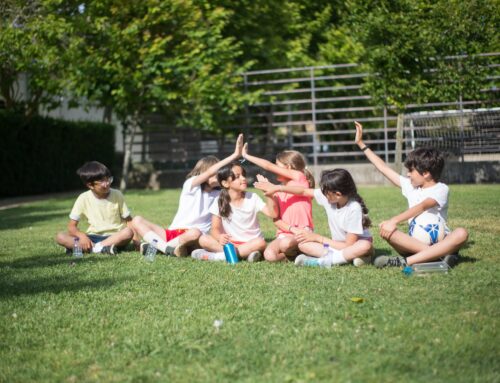When parents disagree about how to parent their children it causes a lot of friction. It’s frustrating when we’re trying to do what we think is right and the very person we expect to have our back isn’t on the same page. Every parent feels like we have the right approach.

The problem in parenting becomes a problem in our relationship. So what to do? The first step when emotions are running high, is to take the time to calm down. Let the dust settle before taking any action. We can have a much higher quality conversation when we’re calm.
Ask Yourselves: Is The Disagreement About Parenting Styles Or Your Rules And Values?
Try to narrow down the area that you’re stuck on. It’s expected that parents won’t always see eye to eye. We’ve developed a unique parenting style based on our own upbringing and experiences. We can have disagreements in parenting styles – one parent can be the good cop and the other one is the bad cop. And even with a similar parenting style, parents can clash over what the rules should be.If you spend a lot of energy disagreeing about day to day things, like what kids can and can’t do, it sounds like a clash over rules.
We need all sorts of rules at home. Rules governing screens, homework, manners and chores, just to name a few. Let’s take table manners as an example – can kids sit on the chair on their knees or do they have to sit on their behind? It might seem like a small issue, but if parents aren’t on the same page, something that small can snowball into a major incident. These little disagreements can grind away at us and make it hard to stay on track.

Do We Have Unrealistic Expectations About Parenting?
Quite often the stress parents feel is caused by the sheer amount of work they are doing. It can be annoying when we feel the other parent is getting more sleep than the other one, we do more of the chores or child care. Resentment happens when we feel we are giving too much.
Parents tend to underestimate how much effort goes into parenting the average child. Most children are 18 years old before they are expected to start supporting themselves. This means the average parent spends 157,680 hours being responsible for them until that age. It takes all that time to get kids into good habits. Every day we are under the pump making sure our kids are in routines while we sort out mornings, mealtimes and bedtimes. We are preoccupied with all this and more until our kids leave home.
Our Parenting Styles Clash More When We’re Stressed
The dynamic between parents adds another level of complexity to parenting. What do we do when our child lashes out? It comes down to the ways we saw problems being solved and the parenting style we absorbed growing up. Mostly we don’t spend time talking about how to solve problems until we’re in the thick of them. If this pattern sounds familiar to you, you are not alone; parents often disagree, their positions becoming entrenched. It’s a situation that’s tiring and emotionally depleting. Before they know it, they’re worn down and exhausted.
For parents trying to solve bigger problems there are patterns that show up, again and again: The child acts out, the parent reacts strongly, sometimes bitterly regretting what they have done or said. We want to deal with it our way and our partner says, no, I want it my way, and this makes us feel unsupported.
A parent who feels unsupported is a stressed parent. It’s even harder to step back and work out what is going on and for the adults let alone our children to calm down. https://gtgparenting.co.nz/2021/01/04/getting-a-united-front-in-parenting/
My Partner Is Strict, I’m Not. Who’s Right?
Many parents raised by strict parents will fall back on that approach. It can feel like the right way to fit a child’s chaotic issues into a neat box. These parents are fond of getting kids to sign contracts. The problem is that we can’t solve relationship issues with contracts unless we’re comfortable with coercion and using power over children. It’s more likely to drive kids away where they will be unsupported and at risk from potentially unsafe influences.
What happens when the child can’t do what is asked because of a lack of skills or our unrealistic expectations? Contracts won’t help a kid who needs more training. Strict parents become even stricter when the pressure is on. Permissive ones can turn into strict parents when they are pushed too far. So which parenting style is going to be best?
Researchers have talked for a long time about the best parenting style to support children – children need firm limits and big empathy. This is the authoritative parenting style. Research tells us that it’s more important to have at least one authoritative parent rather than parents who agree. Anne Fletcher and colleagues asked this question in a study of American high school students. They found that teens were generally better off having at least one authoritative parent – even if the other parent was permissive or authoritarian (Fletcher et al 1999).
The Most Important Message Our Child Needs To Hear – Be An Authoritative Parent
The authoritative parent communicates a vital message. We are the parent who knows them best and who is their safe person. We have high expectations and we are warm, we are not afraid of challenging behaviour either and we know kids will make mistakes. Children need to feel safe without adults reacting to them in their worst moments. Even when strong negative emotions are going on we can handle it, it goes with the territory of being that big-hearted and firm parent. We don’t take it personally.
Working Towards United Front Takes Time And Patience
When you find yourself in a pattern of disagreement with your partner it can help to do an autopsy on what has been occurring. Work out what it is you disagree about and how you can both help your child with their situation. Based on the research into parenting styles it makes sense to look for ways to increase influence, rather than reacting to the circumstance with “tough love”. Be patient and work on ways to move towards that authoritative style, together, one step at a time.
There is a lot of stress on families when there’s a mismatch in parenting style. How to reach an agreement on parenting takes skill and patience. If you want to find out how parent coaching can help you achieve a united front email Justine@gtgparenting.co.nz




